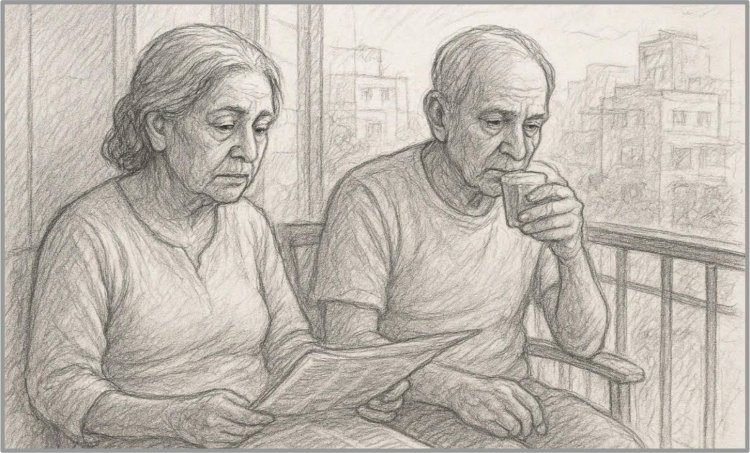By Dr. Ratan Bhattacharjee
THE CLOUDY SKY
The old father was so happy to have got the award for his recently published novel about the poor children of the Santhal community. Rajen was always a good writer in his village, but in his teaching life he could not give much time for writing. He had to struggle hard for earning money, as teachers in those days used to get a scanty salary. He spent a lot of money for his son, in fact his only son, who was more addicted to earning than being devoted to learning. The old father’s love for writing was of no value to the good-for-nothing, money-minded son.
Rajen sat by the window of his small study, the award still shining faintly on the wooden desk. Outside, the sky was heavy with clouds, as if nature itself was trying to paint the turmoil in his heart. He held the certificate and the memento close, remembering the applause, the speeches, and the warmth he had received at the award ceremony. Yet, when he returned home, there was no one waiting eagerly at the door, no cheer, not even a proud smile from his only son, Arindam.
Arindam was away in the city, busy with his business ventures. To him, success meant money, investments, and the shallow recognition of wealth. Literature, art, or even teaching had no place in his dictionary. He often mocked his father, saying, “Baba, writing about poor tribals won’t fill our pockets. Look at me—I’m building an empire. That’s what matters.”
But Rajen knew otherwise. He had lived a life of hardship, shaping young minds as a teacher, nurturing his passion for writing in whatever little time he had. He believed stories mattered—they gave voice to the voiceless, strength to the silent. The Santhal children, barefoot and hungry, had inspired him. Their songs, their dances, their tears, and their resilience had become the soul of his latest novel. And the nation had recognized it. Yet, the one person whose recognition he yearned for remained indifferent.
That evening, Rajen’s old friend, Master Bimal, came to congratulate him. Over tea, Bimal said warmly, “Rajen, you’ve done something remarkable at this age. Your novel is being talked about even in Kolkata. But tell me, why do you look so gloomy?”
Rajen smiled faintly, hiding the heaviness in his heart. “Bimal, clouds cover the brightest sky sometimes. What use is this award when my own son thinks it worthless?”
Bimal sighed. He knew the story. “Children today, they run after money as if it were the only treasure. But, Rajen, don’t forget—the respect you’ve earned cannot be bought. Money vanishes, words remain.”
Rajen nodded, but inside, he felt a deep ache. All his life, he had sacrificed comforts for his son—working late into the night, tutoring students to pay for Arindam’s schooling, even pawning his wife’s ornaments to send him to college. His wife had passed away young, but she too had believed their son would one day make them proud. Now, Rajen wondered if her soul could see this distance between father and son.
Days passed, and the cloudy sky deepened over Rajen’s heart. Arindam rarely called. When he did, his words were curt. “Baba, stop wasting time on these silly writings. If you want, I’ll arrange a comfortable life for you in the city. But please, don’t expect me to clap for your childish awards.”
Rajen listened silently. A father’s love is patient, but his heart cracked a little more each time. He didn’t need money. He needed acknowledgment, affection, and perhaps a little pride.
One morning, as monsoon clouds darkened the village, Rajen received a letter. It was an invitation from a university in Kolkata to deliver a lecture on his novel and the importance of tribal literature. He was overwhelmed—at seventy-two, to be asked to speak at such a platform was no small honor. Trembling with excitement, he wrote to Arindam, hoping he would come to hear him speak.
But on the day of the lecture, Rajen found himself alone. Arindam never turned up. He stood before the eager young faces in the lecture hall, speaking about the Santhal children, about the dignity of labor, about poverty and hope. The students clapped, the professors praised him, yet in his heart there was a hollow echo. “If only my son were here,” he thought.
When he returned to his village that night, the sky was full of thunderclouds. He sat under the tulip tree in his yard, feeling the cool drizzle on his face. The award, the applause, the recognition—all of it seemed like fleeting lightning against the permanence of his son’s neglect.
It was around this time that Rajen fell ill. Old age and years of silent struggle had worn him down. Fever gripped him, and he grew too weak to write. Neighbors came to visit, bringing fruits and kind words, but Arindam remained absent. When Rajen finally sent word through a relative, Arindam arrived—more out of duty than affection.
He entered the dimly lit house with his expensive shoes and tailored suit, the smell of perfume clashing with the earthy scent of the mud walls. Seeing his frail father lying on the cot, he frowned.
“Baba, you should have told me earlier. You know I’m busy. I had to cancel a meeting to come here,” he said impatiently.
Rajen’s eyes, tired but tender, looked at his son. “Arindam, sit down. Do you know what clouds me more than this fever? It is not your absence, but your blindness. You see money, but you don’t see meaning. You count profits, but you don’t count people. The sky of your life will remain cloudy until you learn to value what truly shines.”
Arindam was silent, almost uncomfortable. He muttered something about arranging better treatment and left soon after.
A week later, Rajen passed away quietly, the award lying by his bedside. The villagers mourned deeply. They decorated his grave with wildflowers, and his students—now grown adults—spoke of how his words had changed their lives. His books began to be read more widely, even translated into other languages. The name “Rajen Sen” became a symbol of literature that spoke for the voiceless.
Arindam, however, felt a strange emptiness at his father’s funeral. For the first time, he saw hundreds gather, shedding tears for the old teacher. He heard them speak of Rajen’s greatness, his sacrifices, his vision. Standing there in his polished suit, Arindam realized that his father’s life had touched more souls than his business ever would.
That night, as he sat alone in the village house, the cloudy sky outside seemed to mirror his own turmoil. He walked into his father’s study and saw the pile of handwritten manuscripts, the ink-stained desk, the award glowing faintly in the moonlight. For the first time, he touched the award with reverence. Tears welled up in his eyes.
“Baba, I was wrong,” he whispered into the silence. “Your words were your wealth. And I was too blind to see it.”
The clouds rumbled softly, and in that moment, Arindam felt as though his father’s spirit was forgiving him. He decided then that he would preserve Rajen’s writings, publish his unfinished manuscripts, and let the world hear the voice his father had carried.
Years later, when Arindam himself grew older, he often looked back at that night under the cloudy sky as the turning point of his life. He became the custodian of his father’s legacy, not for money, but for meaning.
And in the quiet corners of the village, whenever the monsoon clouds gathered, people remembered Rajen Sen—the teacher, the writer, the father—whose love for words had outshone even the darkest sky.
The writer of this story is International Tagore Awardee Dr Ratan Bhattacharjee a former Affiliate Faculty Virginia Commonwealth University USA and Multilingual Columnist
Prepared for publication by Angela Kosta, Responsible Editor



